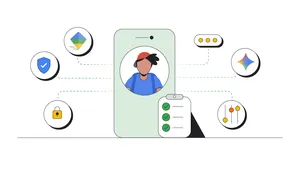Turning AI’s Opportunity into Reality for Africa

We're at such an exciting moment in AI, with technical breakthroughs coming every few months or even weeks. This rapid progress in AI’s development represents an extraordinary opportunity for Africa; turning that opportunity into reality will require all of us to take action. As the Global AI Summit on Africa convenes, now is the time to take stock of what is at stake and what we can do to capitalize on this moment.
Let me begin by highlighting four areas where I see significant potential for AI to benefit everyone:
First, assisting people. AI will increasingly assist, complement, empower, and inspire people. Take for example, Google Translate, which helps people connect, access knowledge and information, and unlock opportunities. When Google first launched Translate in 2006, we offered only a few languages. Since then advances in AI have enabled us to expand to almost 250 languages - 110 of these added in just the last year alone, including African languages that hadn’t been there before like Fon, Kikongo, Luo, Ga, Swati, Venda and Wolof. And we’re working to expand that number to 1000. Google.org is also working with Masakhane Research Foundation and the Gates Foundation to establish an AI Hub for African Languages, which will enable greater multilinguality of critical AI-powered technologies.
Second, transforming sectors and powering economic growth. AI offers the potential to transform sectors that matter, from healthcare to education and agriculture, to the public sector. For the public sector, that could look like advances like personalized and more efficient government services for everyone, in agriculture, improved crop yields, water use and food security. Inside sectors, AI also can power the innovation and growth of entrepreneurs as well as small and large businesses, enabling economy-wide productivity gains and economic growth. To give a sense of the scale of this economic opportunity, GSMA recently shared estimates that suggest that AI could add up to $2.9 trillion to Africa’s economy by 2030. As the continent with the world's youngest and fastest-growing workforce, capitalizing on this opportunity is essential for future prosperity.
Third, advancing scientific progress. One example is AlphaFold, our Nobel Prize winning AI system that enabled the prediction of the structures of all 200 million proteins known to science. Knowledge of protein structures is critical for understanding diseases, developing drugs, treatments, therapies and more. To date, over 2.5 million researchers in over 190 countries are freely using AlphaFold – more than 25K of them right here in Africa. AlphaFold is just one example of how AI is enabling progress in multiple scientific disciplines that are critical to humanity today, and in the future.
Fourth, helping to address societal challenges. Disaster response is an instructive example of what’s possible. With natural disasters like floods, we know that advance warnings can save lives. So at Google we’ve used AI to make advances in flood forecasting and in just two years we’ve expanded to over 100 countries, covering areas where more than 700 million people live – this includes 41 countries in Africa. And in the past month, we’ve rolled out AI-powered Nowcasting in Search across Africa, helping people make informed decisions with high-quality weather forecasts for the next 12 hours. Another area where we’re seeing significant progress is healthcare, where we’ve used AI models for effective diagnosis of diseases affecting millions, from maternal health concerns to diabetic retinopathy. Some of that work has been done right here on the African continent, including recent research on tuberculosis diagnosis in collaboration with the Centre for Infectious Disease Research in Zambia. AI is also making data more accessible and useful to policymakers seeking to address societal challenges with initiatives like Data Commons.
As many of you know well, these opportunities do not come without risks and challenges, like performance issues, misalignment, misapplication, or misuse. However, for me the most profound risk remains the risk of missed use – a term I first encountered during my work with the UN’s High-level Advisory Body on AI – that is, losing out on what AI could enable to advance and improve lives everywhere. We must work on addressing all of these risks and challenges.
So how does Africa capitalize on the opportunities? We must take action in five key areas, detailed in Google’s ‘AI Sprinters’ Policy Blueprint for Africa. In all five, African-led innovation will be critical.
First investment in foundational infrastructure – this means broadband infrastructure and compute capacity through cloud data centers, and other infrastructure. Google has made investments in this area ranging from our Umoja and Equiano fibre cables to the South Africa Cloud region, launched just last month.
Second, is talent development. Equipping Africans with AI skills through training and STEM education is critical. In Sub-Saharan Africa, Google helps millions of young people build new digital skills each year, and we’ve made recent investments in AI talent retraining across Africa and our AI-focused startup accelerator.
Third, expansion of African research and development capacity. We need African researchers and developers working on solutions to continental and global challenges – like Google’s AI teams in Ghana and Kenya.
Fourth, creation and scaling of vibrant AI ecosystems. For entrepreneurs to thrive they need ecosystems of research universities, startups, established companies, venture capital, and access to continental-scale markets and opportunities. Africa needs not just 1 or 2 of these ecosystems but dozens, all across the continent.
Fifth, cross-continent and global partnerships. Collaboration is vital for accelerating and scaling all the above. Again African-led innovation will be essential to making this happen.
And in all of these areas, there is work for governments and policy-makers to enable the actions needed, at a local, regional, and continental scale.
Building on our longstanding presence and investments in Africa, at Google we will continue to work with local and other partners to help Africa capitalize on this AI moment and opportunity. Together, we can co-create a future where AI benefits every African. Let’s get to work.






